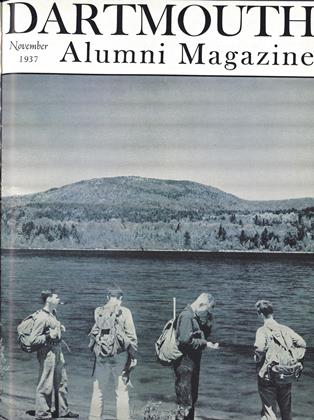The first major effort by an American college to develop the art of movie-script writing was inaugurated at Dartmouth this past month when President Hopkins announced that instruction in script-writing would be given in the upperclass writing courses under the Department of English. This unique project, which is not taking the form of a separate course at the outset, was conceived by Walter Wanger 'l5, Hollywood producer, and is being promoted by him as a memorial to the late Irving Thalberg.
In support of the study and creative work which Dartmouth undergraduates will carry on under the general direction of Prof. W. B. Pressey, chairman of the English department, Mr. Wanger will send to Hanover from time to time outstanding writers, directors, actors, producers, censors, cameramen, editors, and others to talk on their particular fields in the movie industry. Films in the various stages of completion will also be shown in Dartmouth Hall or at the Nugget.
The lack of printed scripts is one of the English department's immediate problems, but with Mr. Wanger's help, a large number of working copies is being added to the scripts now in possession of Baker Library. For the duration of the college year the Library's script collection will be segregated in the Sanborn English House.
Because script-writing is an entirely new field for the English department, it has been decided not to set up a separate course immediately, but instead to explore the ground through the upperclass writing courses already established. All the upperclass composition courses except journalism are involved, including the sophomore course 19-30, the play-writing course under Professors Watson and Bentley, the shortstory course under Professor Morse, and the advanced composition course under Professor Frost. Upperclassmen not enrolled in these courses may study scriptwriting without academic credit, and may arrange for advice and guidance through Professor Pressey.
To STUDY ADVANCE FILMS
One of the features of the program will be the systematic study of the scripts of movies about to be released, so that students may obtain an understanding of the relation between the script version and the motion picture as it actually appears on the screen following cutting and censorship. The laboratory portion of the program will also include the showing of films in the various stages of completion, as well as films that have not yet gone through the cutting process.
The cooperative effort between Mr. Wanger and the College to encourage and develop undergraduate talent for moviescript writing came about through a meeting which President Hopkins and Mr. Wanger had in Hollywood last spring, upon the occasion of the President's alumni trip to the Pacific Coast. Discussion of the movies as a unique art form and of the complete lack of any academic instruction in script-writing comparable to that in play-writing led to the suggestion by Mr. Wanger of a course at Dartmouth and to the enthusiastic acceptance of this idea by the Department of English. The department has modified the original plan somewhat by postponing the establishment of a regular course until the ground has been explored in the existing writing courses. In connection with the Dartmouth project, Mr. Wanger made a trip to Hanover during the latter part of the summer and also conferred with Professor Pressey in New York.
WALTER B. HUMPHREY 'l4 His "Eleazar Wheelock Murals'' will decorate the walls of the Rathskeller inThayer Hall, upperclass dining center, tocommemorate the words of the song immortal to Dartmouth men, written byRichard Hovey '85.
 View Full Issue
View Full Issue
More From This Issue
-
 Article
ArticleThe Making of Civilized Men
November 1937 By ALEXIS CARREL -
 Article
ArticleGradus Ad Parnassum
November 1937 By THE EDITOR. -
 Class Notes
Class NotesClass of 1914
November 1937 By Edwrd Leech -
 Article
ArticleHanover's Most Illustrious Woman
November 1937 By GABRIEL FARRELL '11 -
 Class Notes
Class NotesClass of 1932
November 1937 By Edward B. Marls Jr -
 Class Notes
Class NotesClass of 1928
November 1937 By Osmun Skinner








